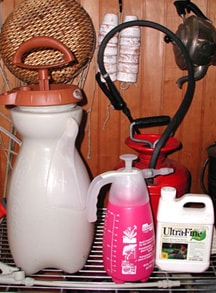Last week a distressed gardener entered the nursery carrying a clear plastic bag, held at arm’s length. In the bag were some stems. “WHAT is on my roses?” the woman asked as she pushed the sample in my direction. “Is it a fungus?” The stems were covered with small white lumps that resembled cotton.
 I looked at the samples closely. “This isn’t a fungus, it’s cottony scale… an insect” I told her. The word “insect” was barely out of my mouth when she stated “I don’t want to use insecticides. Isn’t there another cure?” The remedy I suggested was simple Horticultural Oil. “But is it an insecticide?” my customer asked. I replied that anything that kills insects is an insecticide… even your hand or a fly-swatter. But Horticultural Oil works by smothering the bugs it is sprayed on. People, bees, or other insects that come into contact with the plant won’t be harmed.
I looked at the samples closely. “This isn’t a fungus, it’s cottony scale… an insect” I told her. The word “insect” was barely out of my mouth when she stated “I don’t want to use insecticides. Isn’t there another cure?” The remedy I suggested was simple Horticultural Oil. “But is it an insecticide?” my customer asked. I replied that anything that kills insects is an insecticide… even your hand or a fly-swatter. But Horticultural Oil works by smothering the bugs it is sprayed on. People, bees, or other insects that come into contact with the plant won’t be harmed.
This purified oil kills a variety of insects such as scale, aphids, and whitefly. Many of these feed under the leaves, so the spray has to be directed to the top and underside of foliage. Horticultural Oil, also called Superior Oil, gets mixed with water and is best applied with a tank or pressure sprayer. These sprayers use air pressure to propel the mixture out of a spraying wand, and this wand can be turned to spray underneath the leaves.
Studies have shown that Horticultural Oil is also effective in protecting many plants from fungal disease. When sprayed on healthy foliage, the oil forms a thin coating that prevents diseases like mildew and blackspot from attaching to leaves.
So for foliage protection and smothering insects, Horticultural Oil is a valuable option for gardeners looking for least-toxic treatments.
